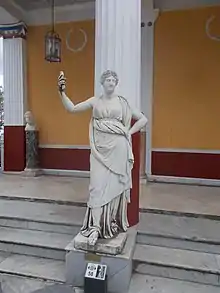Thalia (Grace)
In Greek mythology and religion, Thalia or Thaleia (/ˈθeɪlɪə/[1] or /θəˈlaɪə/;[2] Ancient Greek: Θάλεια Tháleia "the joyous, the abundance") was one of the three Charites, referred to as the Gratiae (Graces) within ancient Rome, along with her sisters Aglaea and Euphrosyne.[3]
| Thalia | |
|---|---|
Goddess of festivity and rich banquets | |
| Member of The Charites | |
 A statue of Thalia in Achilleion palace, Corfu. | |
| Affiliation | Aphrodite |
| Major cult centre | Boeotia |
| Abode | Mount Olympus |
| Personal information | |
| Parents | Zeus and Eurynome |
| Siblings | Euphrosyne and Aglaea |
In art, they were usually depicted dancing in a circle. Thalia was the goddess of festivity and rich banquets and was associated with Aphrodite as part of her retinue.[4][5] The Greek word thalia is an adjective applied to banquets, meaning rich, plentiful, luxuriant and abundant.
Typically, they were the daughters of Zeus and Oceanid Eurynome.[3] Alternative parentage may be Zeus and Eurydome, Eurymedousa, or Euanthe; Dionysus and Kronois; or Helios and the Naiad Aegle.[6][7][8]
 Thalia depicted with her sisters in Antonio Canova's sculpture, The Three Graces.
Thalia depicted with her sisters in Antonio Canova's sculpture, The Three Graces.
In popular culture
- The Charite Thalia is referred to in Neal Stephenson's book The Diamond Age.[9]
- Thalia Grace is the demigod daughter of Zeus in the series Percy Jackson & the Olympians.[10]
- Her brother, Jason Grace, keeps the last name, but is named after a Greek Hero named Jason.
See also
Notes
- http://www.oed.com/view/Entry/200089
- https://www.merriam-webster.com/dictionary/Thalia
- Hesiod, Theogony, 907
- Homeric Hymn 5 to Aphrodite, 58
- Homer, Iliad, 8.360-369
- Cornutus, Compendium of Greek Theology, 15
- Nonnus, Dionysiaca, 15.87 & 48.530
- Pausanias, Description of Greece, 9.35.5
- Stephenson, Neal (1995). The diamond age or, Young lady’s illustrated primer. New York, NY: Bantam Spectra. pp. 240 & 283. ISBN 0-553-09609-5.
- "Thalia Grace". Rick Riordan. Retrieved March 24, 2020.
References
- Apollodoros, Library (I, 3, 1).
- Hesiod, Theogony (v. 907-909).
- Orphic hymns (LIX on the Charites).
- Pausanias, Description of Greece (IX, 35, 1).
- Pindar, Odes (Olympics, 14, str. 1-2).
- Grimal, Pierre, over&source=gbs_ge_summary_r&cad=0#v=onepage&q&f=false The Dictionary of Classical Mythology, Wiley-Blackwell, 1996, ISBN 978-0-631-20102-1. "Thalia" 2. p. 442.
- Smith, William; Dictionary of Greek and Roman Biography and Mythology, London (1873). "Thaleia" 4.